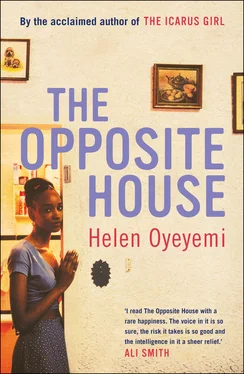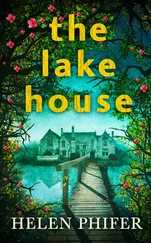Helen Oyeyemi - The Opposite House
Здесь есть возможность читать онлайн «Helen Oyeyemi - The Opposite House» весь текст электронной книги совершенно бесплатно (целиком полную версию без сокращений). В некоторых случаях можно слушать аудио, скачать через торрент в формате fb2 и присутствует краткое содержание. Год выпуска: 2008, Издательство: Bloomsbury UK, Жанр: Современная проза, на английском языке. Описание произведения, (предисловие) а так же отзывы посетителей доступны на портале библиотеки ЛибКат.
- Название:The Opposite House
- Автор:
- Издательство:Bloomsbury UK
- Жанр:
- Год:2008
- ISBN:нет данных
- Рейтинг книги:4 / 5. Голосов: 1
-
Избранное:Добавить в избранное
- Отзывы:
-
Ваша оценка:
- 80
- 1
- 2
- 3
- 4
- 5
The Opposite House: краткое содержание, описание и аннотация
Предлагаем к чтению аннотацию, описание, краткое содержание или предисловие (зависит от того, что написал сам автор книги «The Opposite House»). Если вы не нашли необходимую информацию о книге — напишите в комментариях, мы постараемся отыскать её.
The Opposite House — читать онлайн бесплатно полную книгу (весь текст) целиком
Ниже представлен текст книги, разбитый по страницам. Система сохранения места последней прочитанной страницы, позволяет с удобством читать онлайн бесплатно книгу «The Opposite House», без необходимости каждый раз заново искать на чём Вы остановились. Поставьте закладку, и сможете в любой момент перейти на страницу, на которой закончили чтение.
Интервал:
Закладка:
Between the gates of a decrepit compound, a man in white rests his arm on the rim of a well. He looks the sun askance. Aya stops by him and drinks some water. The empty main house collapses into its own baked torpor and ignores her. The man nods at her. He is her watchmaker from Habana. Aya wants to embrace her watchmaker and make him tell about the seeds he gave her so long ago, the ones that wouldn’t grow. She speaks first, in Yoruba: ‘Peace, Baba. Is all well?’ His wheeze is as jagged-soft as shaved coconut: ‘You find me in peace; my ancestors have not forgotten me.’
Aya is suddenly unsure of him.
‘Do you make clocks?’ she whispers.
Aya’s watchmaker takes her palm and hides it between his own for a moment. When he takes his hands from hers, there is a thick glass bottle on her palm, ‘Drink Me’ size from Wonderland when Alice was too big.
‘That is different water,’ he tells her. ‘If you have seeds that told you “No” before, they will agree to this.’
She nods, looks back as she walks away.
He has forgotten her already. He squints at the sun now, and raises hands dripping with well water to his mouth. Aya juggles the watchmakers’ seeds in her palm, juggles them all the way back to the somewherehouse, where she paces, watched by Proserpine.
Aya thinks.
Proserpine is still; her delicate elbows rest on her knees.
Aya hesitates at the somewherehouse’s side door and looks out at the trees, their tangled mass of leaves and fruit. She decides that the grass outside has plenty. She turns and runs tracks around bewildered Proserpine, sowing seeds that skip and bump across the somewherehouse’s floorboards. She chases the seeds with long shots of water that smells of fusty spice.
All the way to Papi and Chabella’s I watch my shadow, try to step on it, feed it into every hungry, unlucky crack in the pavement. Nobody looks at me strangely. In Mami and Papi’s part of Peckham, jerk chicken, Obalende suya and shops stocking Supermalt and Maggi sauce are seconds away. Neighbours mind their own business, get their shopping done and fix their eyes on something safe until they’re indoors and can bolt up against the evenings, against the rowdies and the graffitists that sit on low walls and smoke and call out smart comments.
When I still lived at home, Chabella — both alarmed and pleased that those boys never seemed to bother me — made me escort Tomás around the area as often as I could. Once she asked me, ‘Why don’t they pick on you? Which one is your boyfriend?’ She didn’t believe me when I told her that it simply seemed to be a matter of smiling a lot and making sure not to ignore them whenever they asked me something.
At home, Mami sits at Papi’s feet, dictaphone in hand, setting German listening exercises in a high voice while Papi watches a programme about the Pharaohs with the sound turned off. The reel of flame-haloed faces in the altar looks away from them and flickers at the ceiling.
Mami asks if I’m singing tonight; I am, and she is excited for me. But Papi, though he hears what we are talking about, says nothing, which is what he usually does when he is asked a challenging question that he needs time to think about. At dinner a month ago, Aaron asked Papi whether he missed Cuba, and Papi remained silent until Chabella turned it into a discussion of Che Cola versus Coca-Cola. Che Cola lost miserably — Papi summed it up as ‘tasting like shit. And not even shit that’s good for you.’
But days later, Papi phoned and asked to speak to Aaron; he answered the question belatedly, the way people who think too much will. He told him, ‘No, I don’t miss Cuba. I’m not sure that I knew what it was when I lived there. I know now from the outside.’
Aaron was holding the phone between us, and he and I shook our heads at each other because that didn’t sound honest to either of us. Aaron said to Papi, ‘I don’t get it.’
Papi said, ‘Of course you get it. A white man in Ghana? The entire time you lived there, you had one foot outside its borders.’
Aaron said firmly, ‘I really think you are wrong to say that, Juan. I am Ghanaian. I was born there.’
I wish that Papi could give me his response to my singing, something that I can say ‘No, you are wrong to say that’ to. I wish he would give me something other than a gently bemused teasing: ‘Why do you like to sing so much? It is too much. Even your Aunt Lucia, she was just crazy for singing, but she calmed down and became an engineer.’
I go upstairs and tiptoe into Papi and Chabella’s bedroom. Chabella’s vanities are all to do with her heart. On top of her dresser, photos of me and Tomás and Papi and Aaron and her cousins and her favourite pupils and all the living that she prays for; all these photos jostle with small, mysterious tasks that she has begun and neglected to finish — a plastic half-bottle of holy water from Lourdes stands beside a full crystal bottle of rose water; both stand on top of a rectangle of ruched silk with a threaded needle dangling from one corner. Handfuls of seeds are strewn amongst wooden beads. Scraps of rice paper, maybe the beginnings of paper chains, are stuck to the side of the desk.
In Mami’s top drawer are her photo albums, and I open one at random, my fingers blunt on the stiff pages, finding her again and again. In all of the pictures, Papi looks at Mami with tender concern, as if he has forgotten that it’s his wedding too.
I find Chabella not just in her tense, happy bride’s face
(she told me that for the entire day she was so happy that she thought she must faint, or die — nothing happened except that her heart grew fuller)
but in the people she left behind her; the way they smile from beneath the impression of her thumb pressed painfully over their faces.
On the phone, Amy Eleni says, ‘You know what I read about rats? I read that if they lived uninterrupted lives, they never stop growing. Imagine! You could get a rat as big as a dustbin. As big as a house.’
( So what , I think. I am painting my nails and thinking of boys’ names.)
‘I mean, what if foetuses were like rats? Say a foetus stays in the womb longer than nine months, what if it went on a growth bender? What if a baby got as big as its mother?’
‘Amy Eleni,’ I say, ‘shut up.’
Why is she saying this? She knows about the hysteric, how she beats me by making things seem funny when they’re not, by finding pain in speculation. But she can’t know how it gets when I think about my son, so when she says, ‘What?’ I just ask her if she still has my purple nail varnish.
Amy Eleni says Despina is not anorexic. She doesn’t say it defiantly; she just says it, because she is sure. According to Amy Eleni, her mother ‘doesn’t give a shit about her weight’. Emily Brontë probably didn’t care that much about her weight either, but she died hungry, with food in the house. I can’t forget Despina’s mint-tea cupboard from the times I went over to Amy Eleni’s house to drink mint tea with all the lovely sugar that Chabella wouldn’t let me have.
The first time, Amy Eleni opened a kitchen cupboard and said, ‘This is the mint-tea cupboard.’ She said it formally, as if the cupboard was a person she was introducing me to. Inside sat one tiny, thick-spouted silver teapot. Behind the teapot was an organic wall of sugar, forty to fifty kilo bags of it, all packed so tightly together that it looked as if a giant fist had punched them into the back wall; the packets had lost their edges and ran into each other.
(I thought, maybe Despina likes her mint tea sweet, maybe she’s a hoarder, maybe she’s an anorexic.)
Amy Eleni looked at me and said, ‘I think it’s more of an aesthetic thing than anything else.’ We were sixteen. Aesthetic was Amy Eleni’s favourite word that week.
Читать дальшеИнтервал:
Закладка:
Похожие книги на «The Opposite House»
Представляем Вашему вниманию похожие книги на «The Opposite House» списком для выбора. Мы отобрали схожую по названию и смыслу литературу в надежде предоставить читателям больше вариантов отыскать новые, интересные, ещё непрочитанные произведения.
Обсуждение, отзывы о книге «The Opposite House» и просто собственные мнения читателей. Оставьте ваши комментарии, напишите, что Вы думаете о произведении, его смысле или главных героях. Укажите что конкретно понравилось, а что нет, и почему Вы так считаете.












